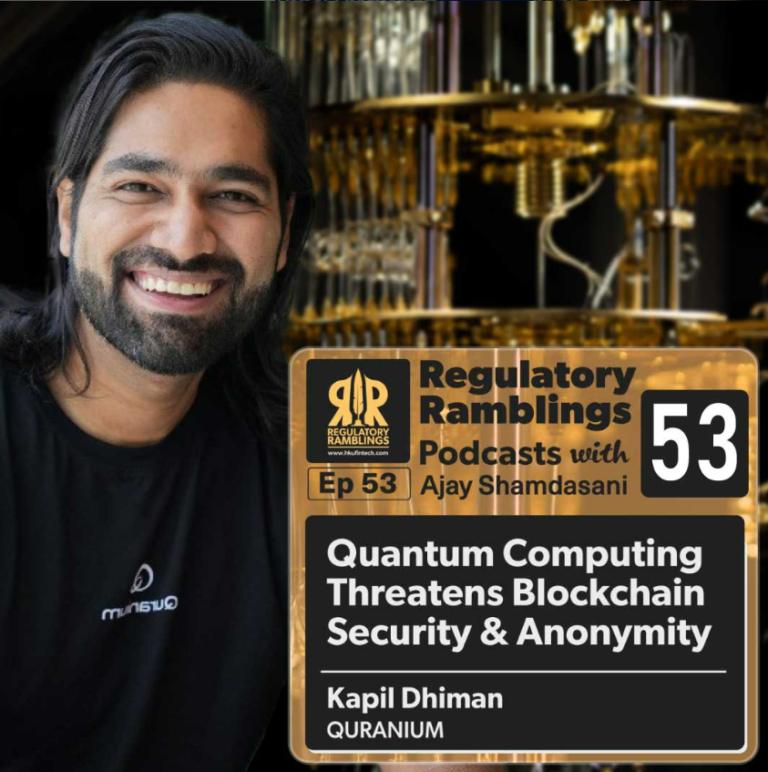Mumbai-based Kapil Dhiman is the co-founder and CEO of Quranium. An entrepreneur to his core with a creative and artistic side—coupled with a passion for problem-solving—Kapil is a seasoned leader with 12 years of diverse international consulting experience in dealing with enterprises, startups, and funds.
He is also a former Web 3.0 leader at PwC India and an award-winning CEO who crafted the Metaverse Startup of the Year 2023 from scratch. Kapil, a distinguished global speaker and author, has helped over 20 startups in the Web3 ecosystem with their go-to-market (GTM) and product strategies.
In this episode of Regulatory Ramblings, Kapil chats with host Ajay Shamdasani on how advances in quantum computing can compromise Blockchain transactional security and anonymity.
Much has been said about quantum computing and how it will revolutionize the world—and part of that is reflected in the new Cold War between the US and China. Beijing is constantly eager to tout its advances in the field, and the American and European mainstream press clamor about how the collective West is falling behind—in a manner almost reminiscent of the US response to the USSR’s 1957 Sputnik launch.
Some, such as Kapil, contend that quantum computing can breach the security of cryptocurrency transactions, notwithstanding the much touted ‘National Security Agency (NSA)-level encryption’ that Polish virtual asset advocates say exists when using a Blockchain.
Kapil shares a bit about his background and the challenges of growing up in a military family with a father he was very temperamentally different from. He recounts the difficulties of starting his firm, the joys and hurts of following an entrepreneurial path, and what he envisages for Quranium.
The discussion defines quantum computing, whether it should be regulated globally, and whether each industry using such computers should devise its own rules. Kapil concludes that each country must decide for itself—in the same way artificial intelligence is regulated globally.
Kapil also shares his thoughts on the notion that AI will come alive once quantum computing reaches a mature state. He addresses the issue of whether there is a mismatch between computing power and the ability to use AI to its fullest potential.
A lingering concern is that AI in its current state is not ‘ real AI’ and that the purest version of AI will require more advanced quantum computing.
The conversation concludes with Kapil commenting on what Web 3.0 means on a practical level. He dispels the cliché that creative and artistic types like himself are not practical and business-savvy, stating that such things can be learned if one is diligent and motivated enough.
We are bringing you the Regulatory Ramblings podcasts with assistance from the HKU Faculty of Law, the University of Hong Kong’s Reg/Tech Lab, HKU-SCF Fintech Academy, Asia Global Institute, and HKU-edX Professional Certificate in Fintech.
You might also be interested in:
- Must have new book by Ross Buckley, Douglas Arner & Dirk Zetzsche – FinTech: Finance, Technology & Regulation
- Building Better Financial Systems: FinTech Sustainability – Research
- HKU-SCF Fintech Academy – website
- Asia Global Institute – website
- HKU-edX Professional Certificate in Fintech
- Most sought-after Fintech course on edX – Introduction to Fintech
Connect with RR Podcast at:
LinkedIn: https://hk.linkedin.com/company/hkufintech
Facebook: https://www.facebook.com/hkufintech.fb/
Instagram: https://www.instagram.com/hkufintech/
Twitter: https://twitter.com/HKUFinTech
Threads: https://www.threads.net/@hkufintech
Website: https://www.hkufintech.com/regulatoryramblings
Connect with the Compliance Podcast Network at:
LinkedIn: https://www.linkedin.com/company/compliance-podcast-network/
Facebook: https://www.facebook.com/compliancepodcastnetwork/
YouTube: https://www.youtube.com/@CompliancePodcastNetwork
Twitter: https://twitter.com/tfoxlaw
Instagram: https://www.instagram.com/voiceofcompliance/
Website: https://compliancepodcastnetwork.net/



